
President Vladimir Putin on Friday signed a law allowing Russian banks and other financial institutions to block the assets of sanctioned foreign organizations and individuals.
The law allows Moscow to freeze the funds and property of legal entities controlled by foreign citizens and organizations against whom Russia has imposed what it calls “special economic measures.”
It also restricts financial transactions carried out “in the interests” of sanctioned foreigners.
Pawnshops, micro-lenders and bookmakers are listed as some of the other financial institutions that are banned from performing operations with sanctioned foreigners.
Russia’s Central Bank is authorized to slap six-month restrictions on these financial institutions if they are found in violation of the “special economic measures.”
At the same time, sanctioned foreigners are allowed to receive wages, pensions and other allowances in their Russian bank accounts. Their spending will be limited to 10,000 rubles ($100) per family member each month.
The law enters force 180 days after its publication on Friday, Aug. 4, 2023.
In April, Putin authorized the expropriation of foreign-owned assets in response to the seizure and freezing of Russian assets abroad in the wake of Moscow’s invasion of Ukraine.
Putin issued a decree in 2018 ordering “special economic measures” against Ukraine in response to Kyiv’s “unfriendly” restrictive measures against Russian citizens and legal entities.
Days later, Russia imposed sweeping sanctions affecting 400 Ukrainian individuals and businesses that froze their Russian-based assets.